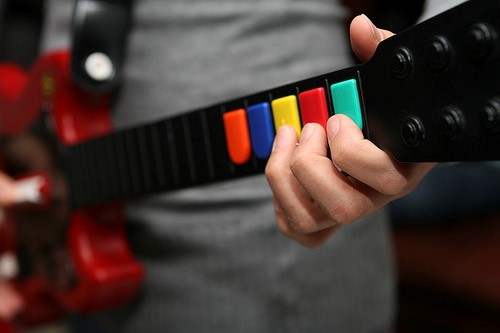
Video Games In The Music Industry
In a world with so many different media platforms to conquer, you can’t blame musicians for branching out into other entertainment genres. Nowadays, bands and solo artists alike tend to create albums, tour, appear at events, broadcast over radio, interact on social media, write books, go on TV and some are even popping up in Hollywood movies.
Alas, there’s a lot of competition out there in the music industry and so artists must find ways to remain relevant, popular and thus, successful. For many acts, the best way to accomplish this has been by appearing in games, which has become even more popular since the world of online gaming and smartphone titles became a reality.
Once the internet began to gain as much traction as other mediums, it just made sense that musicians would also create a niche in the blossoming world of online games. In fact, we’d go as far as to say that the iGaming industry has some of the best music games out there right now. Online casino game software developers NetEnt even created a NetEnt Rocks trilogy featuring favourites such as Jimi Hendrix, Motorhead and Guns N Roses in their very own slots.
Meanwhile, KISS – who are renowned for running with new media platforms – have their own alternative slot over at Guts.com, alongside numerous other musically-included iGaming titles like Spin Party and Retro Super Eighties. However, music games do go a lot further back than you may think.
Back in 1983, Journey received their own arcade game which featured puzzles, mini-games and, of course, animated versions of the five band members. Just two years later, Frankie Goes to Hollywood featured on a Commodore 64 title set in Liverpool – the title of the band’s second album. The idea was to get to the Pleasuredome by completing puzzles and mini-games to collect “pleasure points”. It was all very odd, but UK magazine Zzap!64 gave the game a Gold Medal and an astonishing 97% rating.
By 1990, even Michael Jackson had made his way onto home consoles and into arcades, allowing players to dance their way through a pixelated version of Moonwalker (1988). Not only did players get to visit Café 30 from “Smooth Criminal” and the streets from “Beat It”, there’s even a cemetery packed with zombies a la “Thriller”. In 1993, Xplora1: Peter Gabriel’s Secret World was released, Aerosmith appeared in Revolution X in 1994 and, by 1999, even the Wu-Tang Clan had their own game for PlayStation named Shaolin Style.
As we entered the 2000s, music-based games were everywhere. Dreamcast and Windows users could play KISS Psycho Circus: The Nightmare Child; Britney Spears appeared in 2002’s Britney’s Dance Beat and Jack Black, Ozzy Osbourne, Lita Ford, and Lemmy Kilmister all had cameos in the 2009 game Brutal Legend for PlayStation 3 and Xbox 360. Of course, the real game changer for this era was Guitar Hero, which was released in 2005 and was followed by numerous sequels and spin offs that continue to attract attention even now.
This doesn’t necessarily mean that the music industry is suffering when it comes to music sales though; after all, vinyl and digital download sales are flourishing. Earlier this year, the British Phonographic Industry (BPI) revealed that music consumption in the United Kingdom has increased by 1.5% to 123 million albums. Considering only 200,000 LPs were bought during 2007, this is an incredible statistic. In addition to these sales, in 2016 alone, there were 45 billion audio streams on various sites, an increase of 68% when compared to 2015. Plus, vinyl hasn’t been as popular as it is now since 1991 with 3.2 million units being sold in the last year, a rise of 53%.
As the gaming industry continues to develop, we’re sure that we’ll soon be receiving music virtual reality and augmented reality titles. We already have Rockband VR for the Oculus Rift, which features songs from Alice In Chains, The Black Keys, and 58 other artists. Needless to say, we’re pretty excited about where music games may go in the future, and we can confidently say a lot of musicians probably are too.
